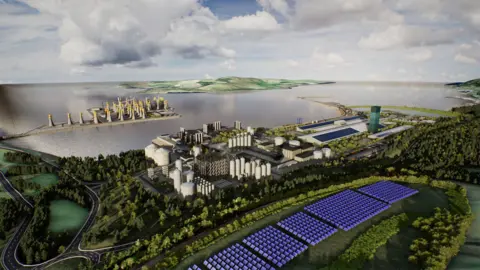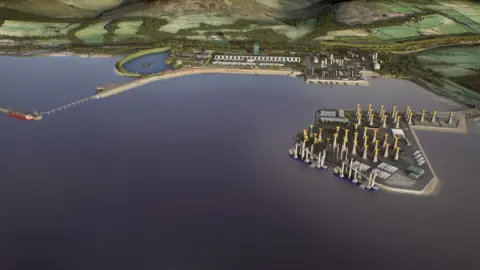New £150m Hunterston port plans given go-ahead
 Peel Ports
Peel PortsA £150m scheme to transform the site of the former Hunterston coal terminal in North Ayrshire has been given the go-ahead.
Peel Ports Clydeport, which owns the site, has been granted planning permission to fill in the dry dock and create a "hub for the blue and green economies".
Plans for the 350 acre (142 hectares) site include the world's largest Liquid Air Energy Storage facility and subsea cable manufacturing.
The company claims the work will attract £3.5bn in inward investment and create more than 5,000 jobs.
The redevelopment work is scheduled to begin in 2025 and will take about two years to complete.
Peel Ports says the work will help increase the opportunities for expanding offshore wind power off the west coasts of Britain.
The company says up to 90% of the site has been optioned by firms in the sustainable energy sector.
Future tenants would include companies working on subsea cable manufacturing and the construction of gravity base structures.
These are very large submersible structures that have heavy bases and sit on the seabed, held in place by their weight and friction.
Traditionally used in the oil and gas industry, the technology behind them is being adapted for use in the off-shore wind sector.
 Peel Ports
Peel PortsLewis McIntyre, managing director of port services at Peel Ports Group, said the site would become a "major facilitator" of the UK's transition to sustainable energy.
“There will be no energy transition without ports, and harnessing the potential of sites like Hunterston is key to achieving the UK’s net-zero goals," he said.
"The knock-on benefits for the local and national economies are also significant. We look forward to working with the policymaking community to create the investment conditions we need to replicate the success of Hunterston at other sites across the country.”
The Hunterston terminal, which sits south of Fairlie opposite the island of Great Cumbrae, was once one of Scotland's most important industrial sites.
It was opened in 1979, creating a deep-water port to allow iron ore for the Ravencraig steelworks to come into the country.
After the closure of Ravenscraig in 1992, it was used to import coal for the Longannet and Cockenzie power stations in Fife and East Lothian.
That business came to an end in 2016 with the closure of Longannet.
The owners began clearing the site in 2019.
